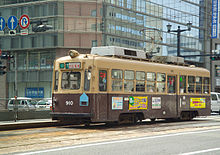
Back النقل بالسكك الحديدية في اليابان Arabic জাপানের রেল পরিবহন Bengali/Bangla Schienenverkehr in Japan German Fervoja transporto en Japanio Esperanto Ferrocarril en Japón Spanish Transport ferroviaire au Japon French Japán vasúti közlekedése Hungarian Transportasi rel di Jepang ID Trasporto ferroviario in Giappone Italian 日本の鉄道 Japanese
| Japan | |||||
|---|---|---|---|---|---|
| Operation | |||||
| Major operators | Japan Railways Group | ||||
| Statistics | |||||
| Ridership | 7.589 billion (2014) | ||||
| Passenger km | 260 billion (2014) | ||||
| System length | |||||
| Total | 30,625 km | ||||
| Electrified | 21,600 km | ||||
| |||||
| Part of a series on |
| Rail transport |
|---|
 |
|
|
| Infrastructure |
|
|
| Service and rolling stock |
|
| Special systems |
|
|
| Miscellanea |
|
|




Rail transport in Japan is a major means of passenger transport, especially for mass and high-speed travel between major cities and for commuter transport in urban areas. It is used relatively little for freight transport, accounting for just 0.84% of goods movement. The privatised network is highly efficient, requiring few subsidies and running with extreme punctuality, though since privatisation several unprofitable but socially valuable lines have been closed by private operators.
